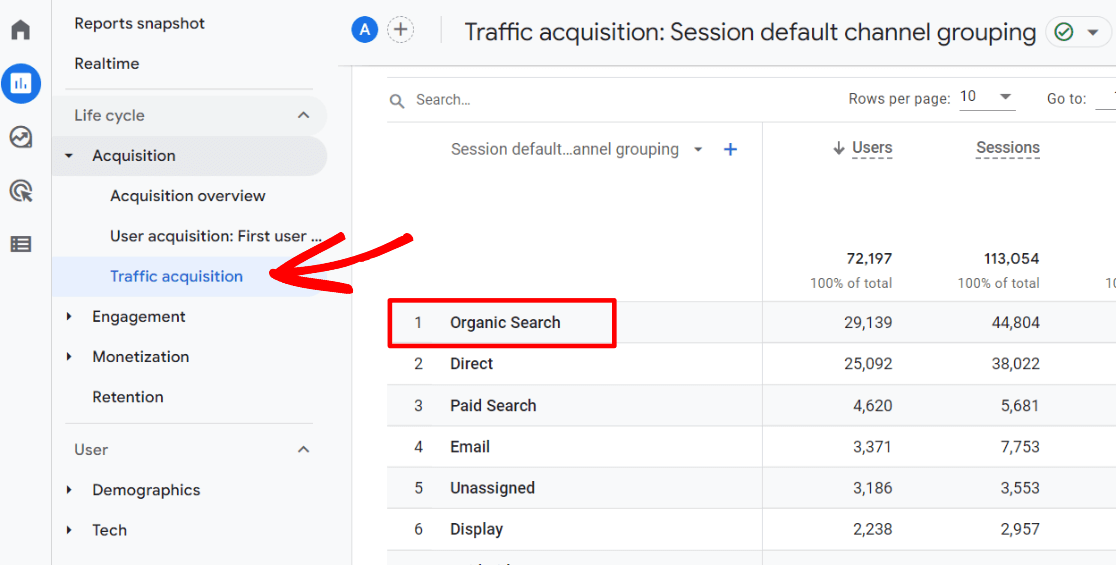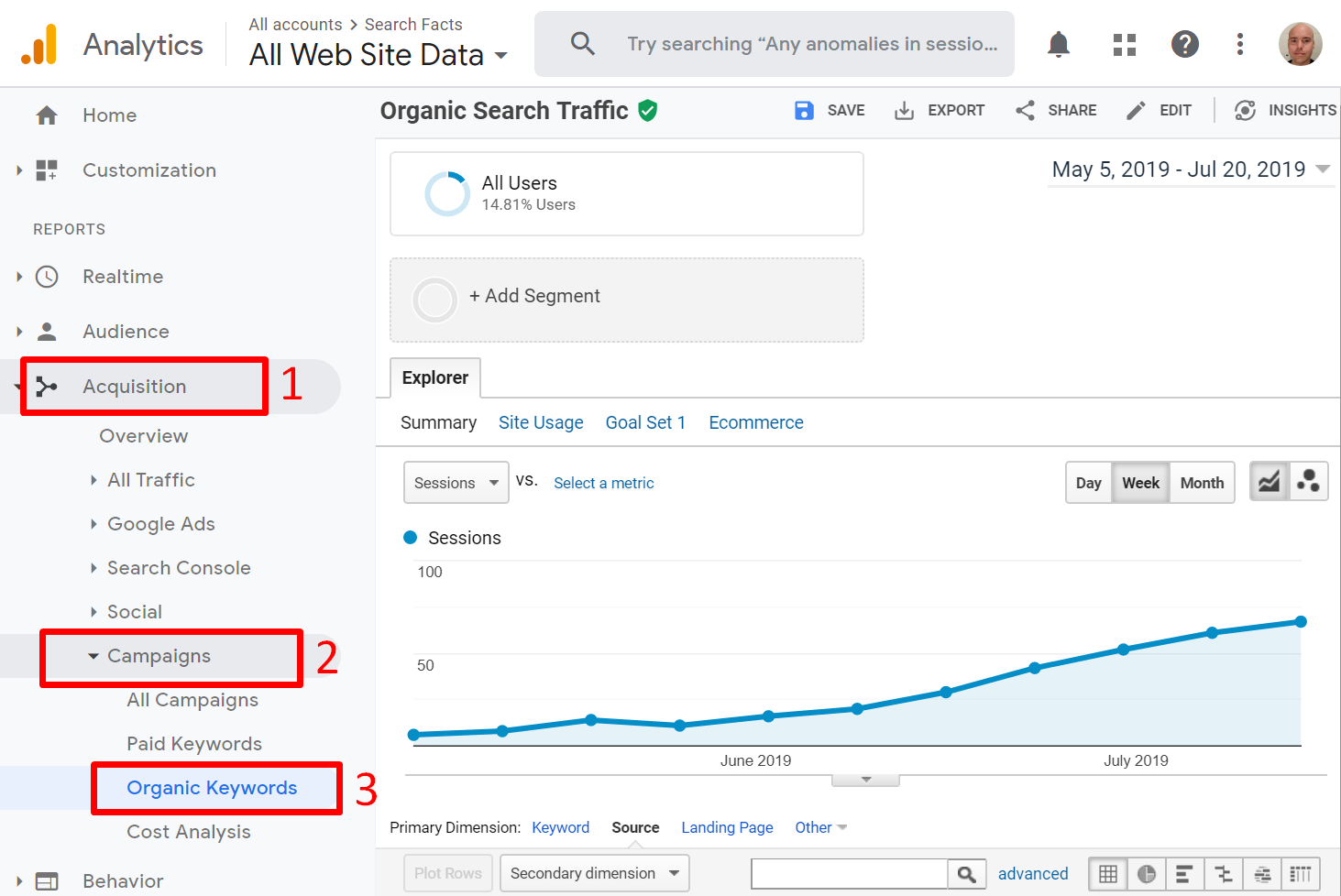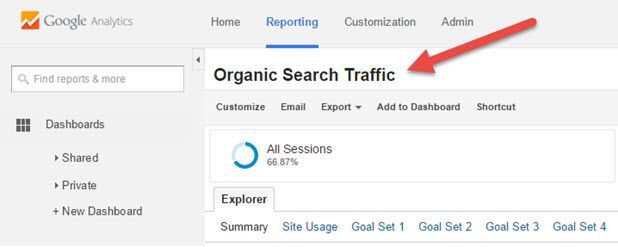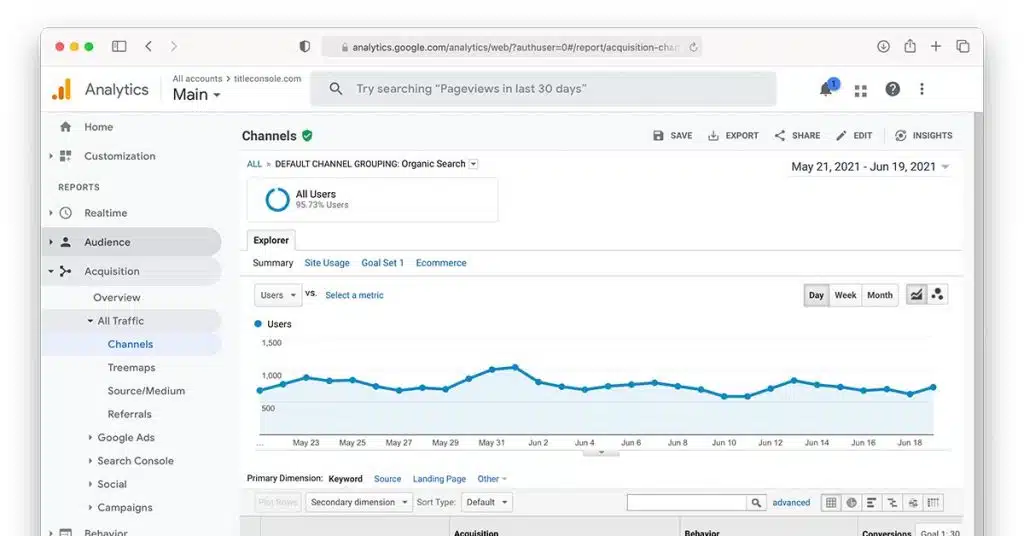Organic traffic in Google Analytics refers to visitors who land on your website through unpaid search results. It indicates the effectiveness of your SEO efforts.
Organic traffic is crucial for any website aiming to achieve long-term success. This type of traffic is cost-effective and brings in highly targeted visitors. By understanding organic traffic, you can better optimize your content and improve your search engine rankings.
Google Analytics helps you monitor and analyze this traffic, offering insights into user behavior, popular pages, and conversion rates. This data allows you to refine your SEO strategy and enhance your online presence. Analyzing organic traffic trends can lead to more informed decisions, ultimately driving sustainable growth for your business.
Introduction To Organic Traffic
Organic traffic refers to visitors who find your site through unpaid search results. These visitors arrive at your site after searching for keywords on search engines like Google. Understanding organic traffic is crucial for improving your site’s visibility and reach.
The Role Of Search Engines
Search engines play a vital role in organic traffic. They index and rank web pages based on relevance. When users search for terms, search engines display the most relevant pages. This process drives organic traffic to your site.
Google is the most used search engine. It uses complex algorithms to rank pages. High-quality content and SEO practices help your site rank higher. The higher your site ranks, the more organic traffic it receives.
Benefits Of Organic Traffic
- Cost-effective: Organic traffic is free. You don’t pay for clicks or impressions.
- Higher credibility: Users trust organic results more than paid ads.
- Long-term results: Good SEO practices can provide long-lasting traffic.
- Better user engagement: Organic visitors are often more engaged and interested.
Organic traffic offers several advantages over paid traffic. It provides a steady flow of visitors without ongoing costs. This makes it a sustainable strategy for long-term growth.
Investing in SEO to boost organic traffic is worthwhile. It enhances your site’s visibility and credibility. Over time, this leads to increased trust and customer loyalty.
Decoding Organic Traffic
Understanding organic traffic in Google Analytics is crucial for website success. Organic traffic refers to visitors who find your website through unpaid search results. This type of traffic is essential for sustainable growth and long-term success.
Key Characteristics
- Visitors arrive through search engines like Google, Bing, or Yahoo.
- No costs are involved in acquiring this traffic.
- Higher trust level because users found you naturally.
- Often more engaged compared to other traffic sources.
Organic Vs Paid Traffic
| Aspect | Organic Traffic | Paid Traffic |
|---|---|---|
| Cost | Free | Involves payment |
| Source | Search engines (unpaid results) | Search engines (ads) |
| Trust Level | High | Variable |
| Engagement | Often higher | Varies |
Organic traffic is crucial for long-term success. Paid traffic can offer quick results, but it requires a budget. Combine both strategies for optimal performance.
Google Analytics: A Brief Primer
Google Analytics is a powerful tool for tracking website performance. It helps understand how users interact with your site. You can monitor various metrics to improve your content and strategy. This guide will delve into how Google Analytics works and its importance in SEO strategies.
How Google Analytics Works
Google Analytics collects data from your website. It uses a tracking code that you embed on your site. This code gathers information about user behavior.
Here’s a simple breakdown of its working:
- Data Collection: The tracking code collects data.
- Data Processing: Google Analytics processes this data.
- Reporting: You get detailed reports on user activity.
These reports help you understand user behavior and preferences. You can see which pages are popular and which need improvement.
Importance In Seo Strategies
Google Analytics is vital for SEO strategies. It provides insights into organic traffic. You can see which keywords drive the most traffic. This helps you optimize content for better rankings.
Here’s a table summarizing key metrics:
| Metric | Importance |
|---|---|
| Organic Traffic | Shows how many users find your site through search engines. |
| Bounce Rate | Indicates user engagement. High bounce rate means low engagement. |
| Average Session Duration | Shows how long users stay on your site. Longer sessions are better. |
By understanding these metrics, you can refine your SEO strategies. You can focus on improving user experience and increasing organic traffic.

Credit: www.monsterinsights.com
Tracking Organic Traffic In Google Analytics
Understanding organic traffic is crucial for your website’s success. Organic traffic refers to visitors who find your site through unpaid search results. Google Analytics offers powerful tools to track this type of traffic. This helps you understand how users interact with your website. Let’s dive into setting up views and filters and navigating to the right reports.
Setting Up Views And Filters
Setting up views and filters is essential in Google Analytics. This ensures you get accurate data about your organic traffic. Follow these steps to set up views and filters:
- Log in to your Google Analytics account.
- Navigate to the Admin section.
- Select the correct property and view.
- Click on “Filters” in the view column.
- Click “Add Filter” and choose “Create new filter”.
- Name your filter “Include Organic Traffic”.
- Select “Custom” filter type.
- Choose “Include” and then select “Medium”.
- Type “organic” in the filter pattern box.
- Save the filter.
By setting up these filters, you ensure that only organic traffic is included in your reports. This helps you get a clear view of your site’s performance.
Navigating To The Right Reports
Once your filters are set up, it’s time to view the reports. Here’s how to navigate to the right reports:
- Log in to Google Analytics.
- Go to the left-hand menu.
- Select “Acquisition”.
- Click on “All Traffic”.
- Choose “Channels”.
In this section, you’ll see different traffic channels. Look for the Organic Search channel. This shows data specific to organic traffic. You can see metrics like sessions, bounce rate, and average session duration.
| Metric | Description |
|---|---|
| Sessions | Total visits from organic search. |
| Bounce Rate | Percentage of single-page visits. |
| Avg. Session Duration | Average time spent on your site. |
By analyzing these metrics, you can understand how well your site is performing in search engines. This helps you make informed decisions to improve your organic traffic.
Analyzing Organic Search Data
Organic search data in Google Analytics offers valuable insights. It helps improve website performance and user experience. Let’s dive into understanding traffic sources and user behavior.
Understanding Traffic Sources
Google Analytics categorizes traffic sources to help you. Organic traffic comes from unpaid search results. This shows users who find your site through search engines.
To view your traffic sources, go to Acquisition > All Traffic > Channels. Here, you can see data on organic traffic. This includes metrics like sessions, new users, and bounce rate.
| Metric | Description |
|---|---|
| Sessions | Total visits to your website |
| New Users | First-time visitors |
| Bounce Rate | Percentage of single-page sessions |
These metrics help you understand how users find and interact with your site.
Assessing User Behavior
Understanding user behavior is crucial for improving your site. Google Analytics offers tools to analyze how users engage with your content.
Navigate to Behavior > Behavior Flow. This section shows the path users take through your site. It helps identify popular pages and drop-off points.
- Pageviews: Total views of a page
- Average Session Duration: Average time spent on your site
- Pages/Session: Average number of pages viewed per session
These metrics highlight user engagement and content effectiveness. Use this data to optimize your website for better user experience.
Improving Organic Traffic With Analytics Insights
Improving organic traffic is crucial for any website’s success. Google Analytics provides valuable insights to boost your traffic. By understanding these analytics, you can make informed decisions. This helps in refining your SEO strategies and content planning.
Seo Optimization Techniques
SEO optimization is the key to improving organic traffic. Use Google Analytics to find high-performing keywords. Focus on these keywords in your content. Also, identify pages with high bounce rates. Improve their content and loading speed.
- Keyword Research: Identify top-performing keywords.
- Content Updates: Refresh old content with new information.
- Page Speed: Optimize images and scripts for faster loading.
Content Strategy Adjustments
Analyzing your content performance is essential. Google Analytics shows which content attracts most users. Focus on creating similar content to boost traffic. Also, identify content with low engagement. Update or remove such content to improve overall quality.
- Content Performance Analysis: Track high-performing posts.
- User Engagement: Improve content that users engage with.
- Content Quality: Remove or update low-performing content.
| Metric | Action |
|---|---|
| High Bounce Rate | Improve content quality and speed |
| High Session Duration | Create similar engaging content |
| Low Conversion Rate | Optimize call-to-action elements |
Challenges In Measuring Organic Traffic
Measuring organic traffic in Google Analytics presents several challenges. These challenges can impact the accuracy and clarity of your data. Understanding these issues is crucial for making informed decisions.
Dealing With ‘not Provided’ Keywords
Google Analytics often shows keywords as ‘not provided’. This occurs due to privacy measures. It masks the search terms users enter. This makes it hard to know which keywords bring traffic.
Without keyword data, optimizing content becomes difficult. You won’t know which terms to focus on. This can limit your SEO strategy. To get around this, use tools like Google Search Console. It offers more keyword insights.
Attribution Issues
Attribution is assigning credit for conversions to different traffic sources. Google Analytics sometimes struggles with this. Organic traffic may get mixed with other sources. This can skew your data.
For example, returning visitors might be counted as direct traffic. This happens if they use bookmarks. To improve attribution, set up proper tracking. Use UTM parameters and custom reports. These can help isolate organic traffic more accurately.
| Challenge | Impact | Solution |
|---|---|---|
| ‘Not Provided’ Keywords | Limited keyword data | Use Google Search Console |
| Attribution Issues | Mixed traffic sources | Set up proper tracking |
Addressing these challenges helps improve your organic traffic insights. This enables better decision-making and SEO strategies.
Case Studies: Success Stories
Understanding how businesses achieve success with organic traffic can inspire your strategy. These case studies highlight real-world examples of companies leveraging organic traffic to grow. Discover their turnaround strategies, and learn from their achievements.
Businesses Leveraging Organic Traffic
Many businesses have mastered the art of organic traffic. Here are some that stand out:
| Business | Industry | Growth Rate |
|---|---|---|
| Company A | E-commerce | 150% |
| Company B | Technology | 200% |
| Company C | Healthcare | 180% |
Company A increased their traffic by 150% in one year. They optimized content with targeted keywords. They also improved their website’s mobile-friendliness.
Company B achieved a 200% growth rate. They focused on creating valuable blog posts. They also engaged in guest blogging.
Company C saw a growth rate of 180%. They invested in a thorough SEO audit. They also focused on building high-quality backlinks.
Turnaround Strategies
These businesses didn’t achieve success overnight. They implemented specific strategies to turn things around:
- Keyword Optimization: Identifying and using the right keywords.
- Content Creation: Producing valuable and engaging content.
- Mobile Optimization: Ensuring the website is mobile-friendly.
- SEO Audits: Conducting regular SEO audits to find and fix issues.
- Backlink Building: Creating high-quality backlinks to boost authority.
These strategies are proven to enhance organic traffic. They are simple yet effective. They can be applied to any business aiming for growth.
Future Of Organic Traffic
The future of organic traffic is evolving rapidly. Search engines are smarter and more efficient. Google Analytics helps track this traffic and understand user behavior. But what does the future hold for organic traffic?
Impact Of Ai And Machine Learning
AI and Machine Learning are changing the way search engines work. Algorithms are now more precise and user-focused. AI helps provide more relevant search results. This means better user experience and more accurate tracking.
- AI improves search result accuracy.
- Machine Learning enhances user experience.
- Better tracking of user behavior.
Predictions For Seo
SEO will see significant changes. Focus will shift to user intent and content quality. Voice search and mobile optimization will become crucial. Structured data will play a bigger role in SERP rankings.
- User intent will drive SEO strategies.
- Content quality will be more important.
- Voice search will grow rapidly.
- Mobile optimization will be key.
- Structured data will impact rankings.
| SEO Factor | Future Importance |
|---|---|
| User Intent | High |
| Content Quality | Very High |
| Voice Search | Growing |
| Mobile Optimization | Essential |
| Structured Data | Increasing |
Stay updated with these changes to keep your organic traffic growing. Leveraging Google Analytics will be more important than ever.

Credit: searchfacts.com

Credit: www.bluecorona.com
Frequently Asked Questions
What Is An Example Of Organic Traffic?
Organic traffic example: A user finds your website through a Google search result without clicking on paid ads.
What Is The Difference Between Organic And Direct Traffic In Google Analytics?
Organic traffic comes from search engines like Google. Direct traffic occurs when users type your URL directly or use bookmarks.
What Is The Difference Between Organic Traffic And Search Traffic?
Organic traffic comes from unpaid sources like search engines. Search traffic includes both organic and paid search results.
What Is A Good Organic Traffic Rate?
A good organic traffic rate varies by industry. Generally, a rate above 50% is considered strong. Focus on quality content.
Conclusion
Understanding organic traffic in Google Analytics is vital for effective online marketing. It helps you gauge your website’s performance. By focusing on organic traffic, you can improve your SEO strategies and attract more visitors. Keep monitoring your analytics to ensure your content reaches its full potential.
Boost your website’s visibility today!





